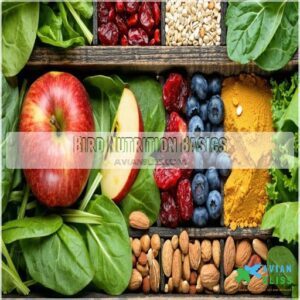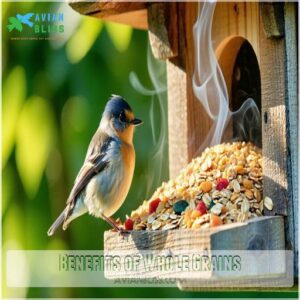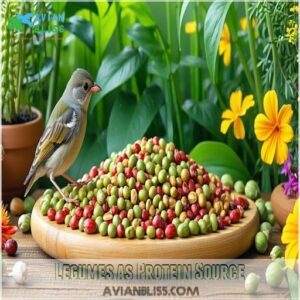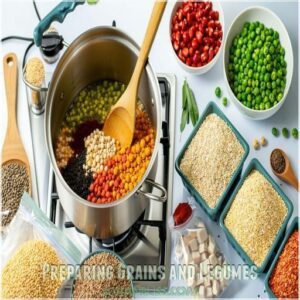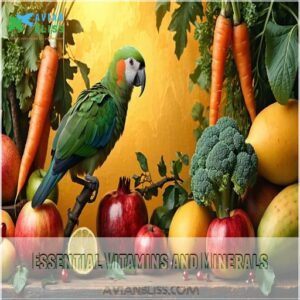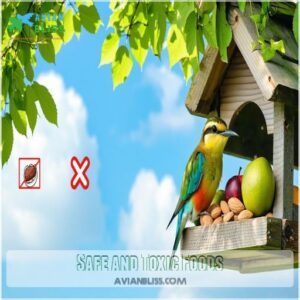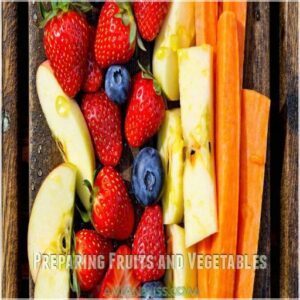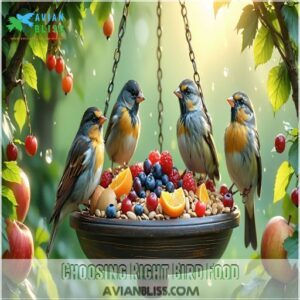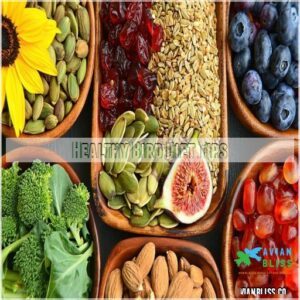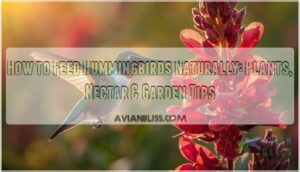This site is supported by our readers. We may earn a commission, at no cost to you, if you purchase through links.
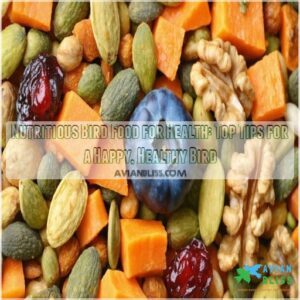
You’ll want to serve up a colorful mix of fresh fruits, vegetables, whole grains, and legumes – think of it as building your bird’s own wellness rainbow. Just like you wouldn’t snack on junk food all day, your bird needs balanced nutrition to maintain those gorgeous feathers and energetic chirps.
Dark leafy greens and carrots boost vision and immunity, while calcium-rich foods like broccoli keep bones strong. Skip the chocolate and avocados though – they’re on the no-fly list.
Table Of Contents
- Key Takeaways
- Bird Nutrition Basics
- Whole Grains and Legumes
- Fresh Fruits and Vegetables
- Choosing Right Bird Food
- Healthy Bird Diet Tips
- Frequently Asked Questions (FAQs)
- What nutrients do birds need?
- Is chicken good for health?
- Should you feed your bird a healthy diet?
- Why do birds eat a good diet?
- What should a malnourished bird eat?
- What do birds eat?
- What is the healthiest thing to feed birds?
- What is the healthiest bird seed?
- What is the best nutrition for birds?
- What should I feed my bird daily?
- Conclusion
Key Takeaways
- Feed your bird a balanced diet with fresh fruits, vegetables, whole grains, protein-packed legumes, and high-quality pellets to ensure optimal health and energy.
- Avoid toxic foods like chocolate, avocado, onions, garlic, and fruit pits to keep your bird safe and healthy.
- Prepare food properly by washing fresh produce, cooking grains and legumes thoroughly, and serving bite-sized portions without seasoning.
- Tailor your bird’s diet to their species-specific needs, mixing in nutritional variety while monitoring portion control and eating habits.
Bird Nutrition Basics
Your bird’s health starts with a diet that provides all the right nutrients in the right amounts.
Understanding how birds process food and the importance of balance can help you make smarter choices at every meal.
Role of Nutrition in Health
A bird’s health thrives on excellent nutrition science. Every bite fuels energy, keeps feathers shiny, and boosts overall wellness. Skipping essential bird nutrients? That spells trouble.
Here’s why nutrition matters: Understanding the bird nutrition basics is important for providing a well-balanced diet.
- Energy: Balanced bird nutrition powers flight and play.
- Healthy Feathers: Shine starts with diet quality.
- Immunity: Essential bird nutrients defend against illness.
- Longevity: Nutrient balance supports a longer, happier life.
Importance of Balanced Diet
A bird’s health thrives on balanced bird nutrition. Mixing fruits, veggies, pellets, and nutritious birdseed keeps their diet variety fresh and exciting. Think of it like planning a dinner party—no bird wants the same dish every day!
Healthy feeding boosts bird wellness, providing energy, shiny feathers, and strong bones.
Make nutrition planning fun for better bird health.
How Birds Process Food
Understanding bird nutrition starts with how their unique digestive system works. The crop acts like a pantry, storing food temporarily, while the gizzard grinds it down—nature’s version of a blender.
Nutrient absorption happens fast in their intestines, thanks to their speedy digestive system. Hydration plays a big role too, keeping everything moving smoothly.
A solid avian diet meets species-specific needs.
Whole Grains and Legumes
Whole grains and legumes are packed with protein, fiber, and essential nutrients that keep your bird energized and healthy.
Cooking them plain and without seasoning makes them a safe and delicious addition to your bird’s diet.
Benefits of Whole Grains
Whole grains are a powerhouse of nutrients for your bird, providing fiber, vitamins, and minerals that boost digestion, feather strength, and energy. Grain types like oats or quinoa offer these benefits.
Birds love the texture of grains, and cooked grains are easier for them to eat. Remember to rinse grains first, rotate options, and avoid processed versions to keep their health benefits intact.
For ideal health, consider bird food choices that include a balanced mix of nutrients.
Legumes as Protein Source
Legumes pack a punch in the context of plant-based protein for birds. They’re nutritious, versatile, and easy to prepare.
Follow these steps to unlock their full potential:
- Cook beans fully — raw ones can be toxic.
- Experiment with mung or adzuki beans.
- Try sprouting techniques for added nutrients.
- Boil legume mixes (no seasoning!).
- Prioritize variety to boost protein intake.
Your bird’s health will thrive!
Preparing Grains and Legumes
Cooking beans and grains for your feathered friend isn’t rocket science!
Rinse lentils, peas, and beans thoroughly, then simmer until tender. Never serve raw legumes—they’re toxic to birds.
For grain options like quinoa or millet, rinse to remove bitter compounds and cook without salt or seasonings. To properly prepare lentils is important for a balanced diet.
Once cooled, you can freeze portions in ice cube trays for easy nutrient balance throughout the week.
Fresh Fruits and Vegetables
Fresh fruits and vegetables are nature’s perfect treats for your feathered friend, packed with essential vitamins and minerals that support their health.
Just like wild birds feast on diverse produce in their natural habitats, you can offer your pet bird a rainbow of options from crisp apple slices to leafy greens.
This makes every meal an exciting adventure in nutrition.
Essential Vitamins and Minerals
Your feathered friend needs specific vitamins and minerals to thrive.
Vitamin A, found in dark leafy greens and carrots, supports healthy vision and immune function.
Calcium, essential for strong bones, comes from mineral-rich foods like broccoli and kale.
For ideal nutrient absorption, offer a colorful mix of vitamin-rich bird food like mangoes, pomegranates, and yellow squash, which provide essential minerals through natural sources.
Understanding essential vitamins is vital for maintaining a balanced diet that supports overall bird health and well-being.
Safe and Toxic Foods
Birds can be surprisingly sensitive to certain foods, making food safety important for their well-being. While unsalted nuts and fresh fruits are bird-friendly foods with high nutritional value, chocolate and avocados are absolute no-gos.
Watch out for onions, garlic, and fruit pits containing cyanide – they’re toxic substances that can harm your feathered friend. It’s key to consult a bird safety guide to confirm your bird’s safety and maintain prime avian health.
Stick to a toxic food list to guarantee your bird’s safety and maintain prime avian health.
Preparing Fruits and Vegetables
Now that you know which foods to avoid, let’s focus on proper preparation.
Start by washing fruits and vegetables thoroughly to remove pesticides and dirt – a simple rinse won’t cut it.
Chop produce into bite-sized pieces your feathered friend can manage.
For nutrient preservation, serve fresh food at room temperature and remove any uneaten portions after two hours to prevent bacterial growth.
Choosing Right Bird Food
You’ll discover how to pick the right mix of pellets, seeds, and fresh foods that’ll keep your feathered friend healthy and happy.
Just like planning meals for your family, choosing bird food means finding the perfect balance of nutrients while keeping your pet’s specific needs in mind, which involves perfect balance.
Commercial Bird Food Options
Looking for the best bird food can feel like searching for a needle in a haystack.
Premium bird food comes in various pellet types and seed mixes, each packed with essential nutrients.
Here’s what experienced bird owners typically stock up on:
- Black-oil sunflower seeds for year-round energy
- Niger seeds to attract finches
- Safflower seeds for cardinals
- Suet blocks for winter nutrition
When selecting a bird seed mix, consider the specific dietary needs of your bird species.
Store these vitamin-rich options in airtight containers to maintain freshness.
Supplementing With Fresh Foods
Fresh food options can kick your bird’s diet up a notch, complementing their regular pellets or seeds.
A nutritious diet rich in raw nutrition means mixing things up with fresh produce and healthy snacks.
Including a variety of Fresh Bird Treats in your bird’s diet can provide essential vitamins and minerals.
| Fresh Food | Benefits | Preparation | Serving Size | Storage |
|---|---|---|---|---|
| Leafy Greens | Vitamins | Wash, chop small | 1-2 leaves daily | 3-4 days refrigerated |
| Berries | Antioxidants | Rinse well | 2-3 pieces | 2-3 days refrigerated |
| Carrots | Beta carotene | Grate or slice thin | 1 tbsp | 1 week refrigerated |
| Sweet Potato | Fiber, vitamins | Steam, cool | 1 tbsp | 3-4 days refrigerated |
| Sprouts | Protein boost | Rinse thoroughly | 1 tsp | 2 days refrigerated |
Special Considerations for Species
Different species require individualized diets based on their natural feeding habits. Through your bird’s unique nutritional needs, you’ll discover that one size doesn’t fit all. For example, incorporating high-quality best bird food is essential for ideal nutrition.
Here’s what shapes your bird’s specific needs:
- Small finches need more frequent meals due to faster metabolisms
- Larger parrots require higher protein levels for muscle maintenance
- Young birds need extra calcium for growth
- Older birds benefit from easily digestible foods
- Active species demand more energy-rich nutrients
Healthy Bird Diet Tips
Understanding the basics of bird nutrition and feeding habits makes it easier to keep your feathered friend healthy.
Your bird’s health starts with proper portions of fresh foods, pellets, and treats, along with clean water changed daily.
Avoiding Common Feeding Mistakes
Now that you’ve selected quality bird food, let’s protect your feathered friend from common feeding pitfalls. Even with the best intentions, these mistakes can lead to nutritional deficiencies or malnourished birds.
| Mistake Type | Common Error | Smart Solution |
|---|---|---|
| Food Choice | Offering bread | Fresh vegetables & fruits |
| Hygiene | Dirty feeders | Daily cleaning routine |
| Consistency | Empty feeders | Regular portion control |
| Setup | Poor placement | Safe, accessible spots |
| Pests | Scattered food | Use covered feeders |
Monitor freshness checks and avoid toxic ingredients like chocolate or avocado. Remember, food diversity beats overfeeding any day.
Encouraging Balanced Eating
Getting your bird to embrace a balanced diet is like teaching a toddler to love vegetables – it takes patience and smart strategies. Mix new foods with familiar favorites, and remember that portion control matters.
Try mimicking nature by offering food variety throughout the day.
When your feathered friend tries something new, use positive reinforcement. Making gradual changes in diet planning supports lasting healthy eating habits.
Monitoring Bird Health and Happiness
Your bird’s daily habits tell you volumes about their health. Watch for steady weight, bright feathers, and consistent activity levels. Happy pet birds stay playful and maintain regular social interaction.
Keep a log of their droppings – changes can signal nutritional deficiencies.
If you notice sudden shifts in appetite or behavior, it’s smart to check with your vet about their bird nutrition needs.
Frequently Asked Questions (FAQs)
What nutrients do birds need?
Birds need a balanced mix of proteins for feathers and muscles, fats for energy, and carbohydrates for daily activities.
Plus, they need vitamins and minerals for bone health.
Don’t forget calcium – it’s essential for egg-laying birds.
Is chicken good for health?
Despite common beliefs, feeding chicken to domestic birds isn’t recommended.
While wild birds might eat small amounts naturally, cooked poultry can introduce harmful bacteria and create unhealthy dietary habits in your feathered friend.
Should you feed your bird a healthy diet?
You’ll want to feed your feathered friend a balanced diet of pellets, fresh fruits, and vegetables.
It’s essential for their health, just like your own body needs good fuel to thrive.
Why do birds eat a good diet?
Like a well-oiled machine, your bird’s body thrives on proper nutrition.
You’ll boost their energy, strengthen their immune system, and keep their feathers vibrant when you provide balanced, nutrient-rich meals daily.
What should a malnourished bird eat?
Start with nutrient-rich pellets mixed with soft fruits like mango or banana.
Add cooked legumes for protein and dark leafy greens for vitamins.
Don’t forget fresh water and monitor their eating habits closely.
What do birds eat?
Your feathered friends enjoy a variety of foods, from seeds and fruits to insects and grains.
They’ll munch on pellets, berries, leafy greens, and even small bits of cooked pasta as treats.
What is the healthiest thing to feed birds?
Pellets provide complete nutrition.
Fresh fruits and vegetables add essential vitamins.
Cooked legumes and healthy grains should be mixed in, creating a diverse diet that keeps your feathered friends thriving.
What is the healthiest bird seed?
Black oil sunflower seeds offer high-quality protein and healthy fats, packing the most nutrition for birds.
Mix them with white millet and nyjer seeds for a well-rounded blend that’ll keep your feathered friends thriving.
What is the best nutrition for birds?
Imagine your parrot thriving with vibrant feathers and endless energy.
The best bird nutrition includes a mix of natural produce, cooked grains, protein-rich legumes, and balanced pellets.
While avoiding toxic foods like chocolate and avocado.
What should I feed my bird daily?
Feed your bird a mix of pellets, fresh fruits (like apples or bananas), and vegetables (such as kale or carrots) daily.
Always provide clean water.
Add cooked grains or beans occasionally for variety.
Conclusion
A healthy bird is a happy bird, and it all starts with offering nutritious bird food for health and energy.
Create a balanced diet with whole grains, protein-packed legumes, and colorful fruits and veggies while keeping toxic foods like chocolate and avocado out of reach.
Pay attention to your bird’s species-specific needs, mix in fresh options, and watch them thrive. With the right choices, you’ll support strong feathers, bright chirps, and a companion that’s full of life.
- http://redheadedcatbirds.com/
- https://bestfriends.org/pet-care-resources/best-parrot-diet-and-toxic-foods-avoid
- https://www.thesprucepets.com/tasty-nutritious-treats-for-your-bird-390629
- https://lafeber.com/pet-birds/bird-food-guide/
- https://windycityparrot.com/the-ultimate-guide-to-safe-and-healthy-foods-for-pet-birds/

